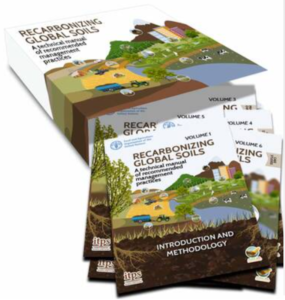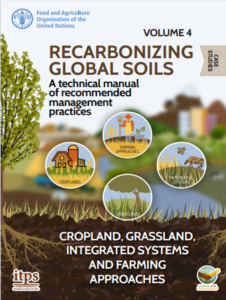
Never Ending Food was asked by the Food and Agriculture Organization of the United Nations (FAO) to present a case study of their Permaculture practices in Malawi to be included in their newly released manual on ‘Recarbonizing Global Soils‘.
The entire case study may be downloaded for free by clicking here. The following are a few excerpts from this chapter in the manual:
“Never Ending Food (NEF) is a community-based initiative in Malawi, Africa which uses Permaculture design to address developmental issues of food/nutrition security, poverty reduction, climate change, and sustainable agriculture. Permaculture is a term coined in Australia in the 1970s from the combination of the two words permanent and agriculture. It is an agroecological-based philosophy, which uses consciously designed landscapes to mimic the diversity, stability, and resilience of natural ecosystems 2021. Through a sustainable integration between landscapes and people, Permaculture serves to fulfill human requirements for food, energy, shelter, and other material and non-material needs (Mollison, 1988).

NEF is 1.2 hectares in size, which is the average landholding size per family for smallholder farmers in Malawi (FAO, 2015). Despite the fact that Permaculture principles may be scaled up to design large-scale commercial farms or even urban cities (OSU and Millison, 2020), 1.2 hectares allows for the implementation of methods which are replicable in both size and scale for the majority of Malawians. In terms of soil management, NEF integrates a diverse range of methods, including: mulch, compost, green manure, liquid manure, agroecology, ecological succession, vermiculture, crop rotation, diversified polyculture, agroforestry, cover-crops, low-to-no till soil preparation, aquaculture, food forests, woodlot management, and intercropping. It has been estimated that in tropical climates it can take up to 200 years to form 1 cm of soil naturally (Osman, 2013). The methods employed by NEF, such as mulching with diversified organic matter up to 15-20 cm deep (often with multiple applications throughout the year in various areas), serves to promote the continual and regenerative return of organic matter, adding up to 2-4 cm of soil per year (the equivalent of 400-800 years of natural soil formation). NEF also places a significant emphasis on the designing of ecosystems which reflect the natural patterns and functionality of forest systems. Through the establishment of perennial tree crops, NEF is able to provide for year-round access to foods, medicines, fuel, building materials, fiber, shade, windbreaks, soil stabilization, and nutrient cycling.
NEF uses Permaculture principles to help Malawi meet the United Nations’ Sustainable Development Goals, which are designed to help countries achieve social, economic, and environmental sustainability by 2030 (United Nations, 2018). The goals specific to NEF’s work include: climate action, sustainable cities & communities, good health & wellbeing, zero hunger, responsible consumption & production, life on land, clean water & sanitation, no poverty, and partnerships for the goals. In addition, NEF conducts community outreach, hosts weekly tours, and runs an internship program to help train and certify community members in Permaculture Design. NEF has been influential in introducing Permaculture into national level programs through various development partners, such as the Ministry of Education’s School Health and Nutrition Program, which piloted Permaculture implementation in eight districts in 40 primary schools, 10 teacher development centers, and one teacher training college. NEF has also been able to assist large-scale implementers, such as USAID, in helping to show how Permaculture can be used as a ‘best practice’ for development activities (Greenblott and Nordin, 2012).”
